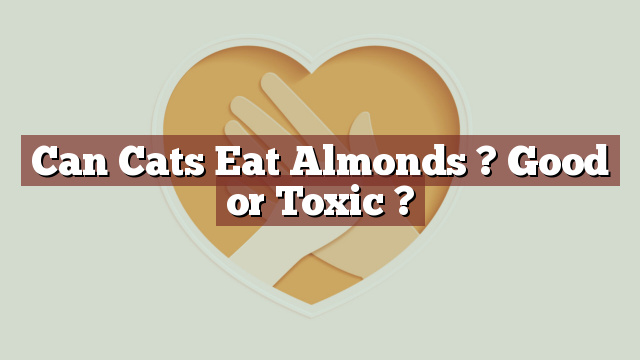Can Cats Eat Almonds ? Good or Toxic ?
Knowing what foods are safe for our beloved pets is crucial for their well-being and overall health. As cat owners, we often find ourselves wondering if a particular food is safe to share with our feline friends. One such food that sparks curiosity is almonds. Almonds have long been recognized for their nutritional value and health benefits for humans. However, it is important to understand if this applies to our furry companions as well.
Nutritional Value of Almonds: What Do They Provide for Cats?
Before diving into whether cats can eat almonds or not, let’s take a moment to understand the nutritional value that almonds offer. Almonds are a rich source of healthy fats, protein, fiber, vitamins, and minerals. They are known to be high in vitamin E, which promotes healthy skin and coat. Additionally, almonds contain calcium, magnesium, and potassium, which are essential for maintaining strong bones and muscles.
Can Cats Eat Almonds? Safety and Toxicity of Almonds for Cats
No, cats should not eat almonds. While almonds offer a variety of health benefits for humans, they can pose potential risks to our feline companions. Almonds are not toxic to cats per se, but they can be difficult for them to digest. Cats have a different digestive system compared to humans, and certain foods that are safe for us can cause digestive issues for them. Almonds are particularly high in fats, which can lead to gastrointestinal upset, including stomach pain, vomiting, and diarrhea in cats.
Furthermore, almonds may present a choking hazard due to their size and shape. In some cases, cats may try to swallow whole almonds, which can block their airway or cause an obstruction in the digestive tract. Additionally, almonds can be salted or flavored, which can further exacerbate the potential risks for cats.
Potential Risks and Benefits of Almonds for Feline Health
While almonds are not recommended for cats, it is important to consider the potential risks and benefits they may have on feline health. The high fat content in almonds can contribute to weight gain and obesity in cats if consumed regularly. Obesity can lead to various health issues such as diabetes, heart problems, and joint pain. Therefore, it is best to avoid feeding almonds to cats altogether.
On the other hand, the nutritional components found in almonds can be obtained through a balanced and appropriate feline diet. Cat food formulated specifically for their needs contains all the essential nutrients in the right proportions, ensuring proper feline health without the risks associated with certain human foods.
My Cat Ate Almonds! What Should I Do? Steps to Take
If you suspect that your cat has consumed almonds, it is crucial to monitor their behavior and overall health. If your cat only consumed a small amount of almonds and shows no immediate signs of distress, it may not be a cause for immediate concern. However, if you notice any symptoms such as vomiting, diarrhea, or difficulty breathing, it is important to contact your veterinarian immediately. They will be able to provide you with the appropriate guidance and advice based on your cat’s specific situation.
Conclusion: Almonds – Proceed with Caution for Feline Consumption
In conclusion, while almonds offer various nutritional benefits for humans, they are not suitable for feline consumption. Cats should not eat almonds due to the potential risks they pose, including digestive issues and choking hazards. It is always best to stick to a balanced, veterinarian-approved diet for your cat to ensure their health and well-being. If you have any concerns or questions regarding your cat’s diet or potential ingestion of harmful foods, consulting with a veterinarian is always recommended. Our furry friends rely on us to make informed choices, and by doing so, we can provide them with a safe and nourishing environment.
Thank you for investing your time in exploring [page_title] on Can-Eat.org. Our goal is to provide readers like you with thorough and reliable information about various dietary topics. Each article, including [page_title], stems from diligent research and a passion for understanding the nuances of our food choices. We believe that knowledge is a vital step towards making informed and healthy decisions. However, while "[page_title]" sheds light on its specific topic, it's crucial to remember that everyone's body reacts differently to foods and dietary changes. What might be beneficial for one person could have different effects on another. Before you consider integrating suggestions or insights from "[page_title]" into your diet, it's always wise to consult with a nutritionist or healthcare professional. Their specialized knowledge ensures that you're making choices best suited to your individual health needs. As you navigate [page_title], be mindful of potential allergies, intolerances, or unique dietary requirements you may have. No singular article can capture the vast diversity of human health, and individualized guidance is invaluable. The content provided in [page_title] serves as a general guide. It is not, by any means, a substitute for personalized medical or nutritional advice. Your health should always be the top priority, and professional guidance is the best path forward. In your journey towards a balanced and nutritious lifestyle, we hope that [page_title] serves as a helpful stepping stone. Remember, informed decisions lead to healthier outcomes. Thank you for trusting Can-Eat.org. Continue exploring, learning, and prioritizing your health. Cheers to a well-informed and healthier future!

